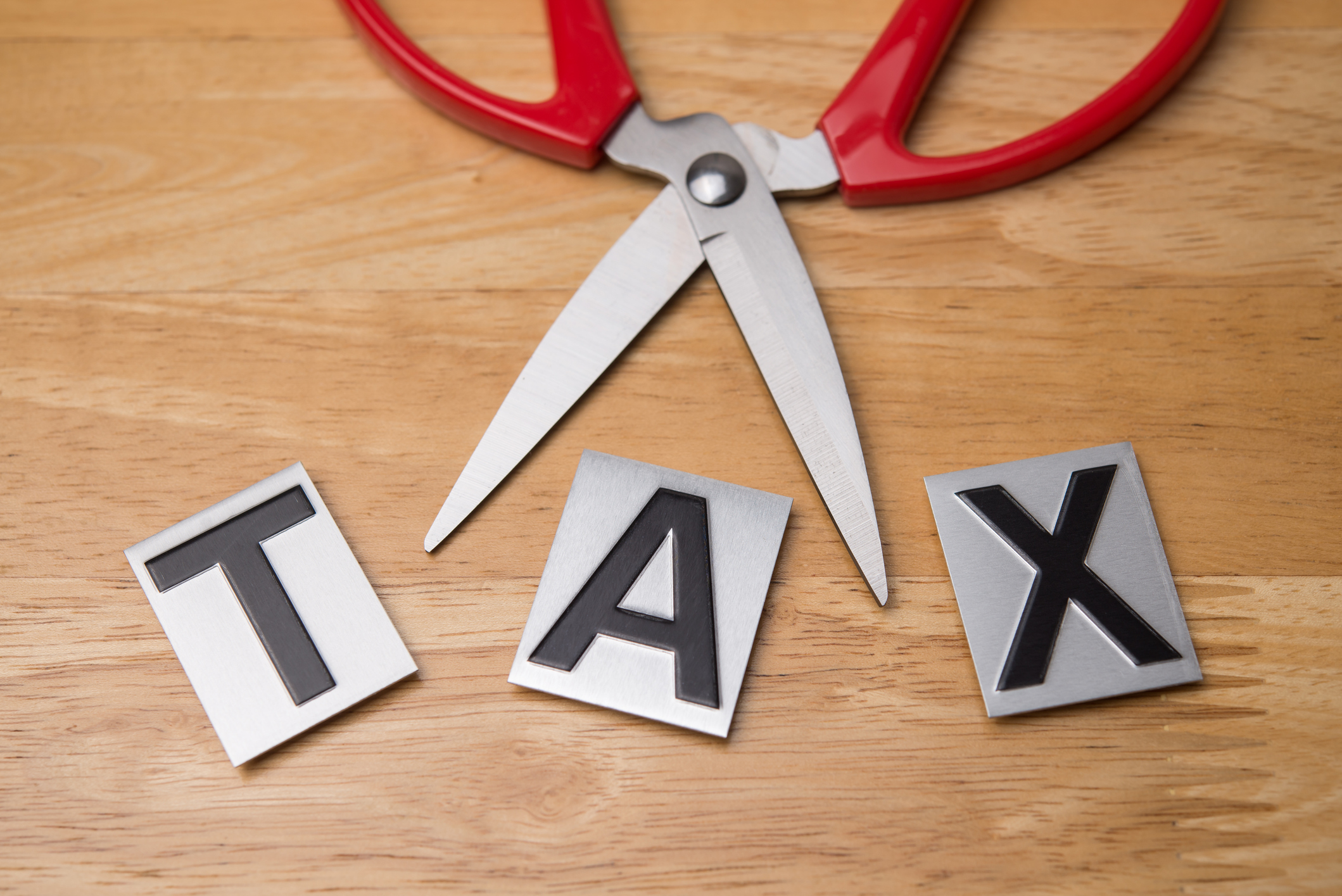'Unprecedented' Private School Voucher Tax Credit in Trump's Megabill
The so-called ‘One Big Beautiful Bill’ is now law, and one provision calls for a major tax break for private school donors.


Profit and prosper with the best of Kiplinger's advice on investing, taxes, retirement, personal finance and much more. Delivered daily. Enter your email in the box and click Sign Me Up.
You are now subscribed
Your newsletter sign-up was successful
Want to add more newsletters?

Delivered daily
Kiplinger Today
Profit and prosper with the best of Kiplinger's advice on investing, taxes, retirement, personal finance and much more delivered daily. Smart money moves start here.

Sent five days a week
Kiplinger A Step Ahead
Get practical help to make better financial decisions in your everyday life, from spending to savings on top deals.

Delivered daily
Kiplinger Closing Bell
Get today's biggest financial and investing headlines delivered to your inbox every day the U.S. stock market is open.

Sent twice a week
Kiplinger Adviser Intel
Financial pros across the country share best practices and fresh tactics to preserve and grow your wealth.

Delivered weekly
Kiplinger Tax Tips
Trim your federal and state tax bills with practical tax-planning and tax-cutting strategies.

Sent twice a week
Kiplinger Retirement Tips
Your twice-a-week guide to planning and enjoying a financially secure and richly rewarding retirement

Sent bimonthly.
Kiplinger Adviser Angle
Insights for advisers, wealth managers and other financial professionals.

Sent twice a week
Kiplinger Investing Weekly
Your twice-a-week roundup of promising stocks, funds, companies and industries you should consider, ones you should avoid, and why.

Sent weekly for six weeks
Kiplinger Invest for Retirement
Your step-by-step six-part series on how to invest for retirement, from devising a successful strategy to exactly which investments to choose.
President Donald Trump’s sweeping tax cut and spending bill is now law, and one provision that would have helped the wealthy avoid capital gains tax was written out.
Tucked within the mega-legislation known as the “One Big Beautiful Bill” (OBBB) is a provision that some tax policy analysts call unprecedented, because it calls for a dollar-for-dollar federal tax credit for donations to private school voucher programs with no budgetary cap.
The legislation reduces the tax incentive for most charitable giving, while nearly tripling the tax incentive available to donors that fund free or reduced private K-12 schools, according to the Institute on Taxation and Economic Policy (ITEP).
From just $107.88 $24.99 for Kiplinger Personal Finance
Become a smarter, better informed investor. Subscribe from just $107.88 $24.99, plus get up to 4 Special Issues

Sign up for Kiplinger’s Free Newsletters
Profit and prosper with the best of expert advice on investing, taxes, retirement, personal finance and more - straight to your e-mail.
Profit and prosper with the best of expert advice - straight to your e-mail.
Written out of the final version of Trump’s tax bill is a capital gains tax write-off. An earlier version of the partisan legislation allowed donors who contribute appreciated assets, such as corporate stock, to Scholarship Granting Organizations (SGOs) an additional tax benefit: capital gains tax avoidance.
The final version of Trump’s megabill could cost the U.S. as much as $25 billion per year, the National Education Association (NEA) estimates.
Here’s what you need to know about the private school voucher tax break, and what it could mean for your finances.
What is a tax credit voucher?
The private school voucher tax break, designed to reward individuals who make charitable donations to SGOs, is a modified version of the proposed Educational Choice for Children Act.
SGOs are non-profit organizations that distribute donated funds to students via scholarships, often for private school tuition. The awards can be used to pay for tuition, books and homeschooling costs.
How would the voucher tax credits work?
- In exchange for a donation to private K-12 school vouchers, taxpayers will get a dollar-for-dollar tax credit.
- The nonrefundable tax credit will be worth up to $1,700 (rather than 10%) of adjusted gross income as suggested originally.
The concept will promote private school choice by using public funds to help families pay for private school tuition or homeschooling expenses. That includes religious schools, which most voucher students attend.
It’s also referred to as “universal school choice,” a policy that the Trump administration has advocated for. It also aligns with Project 2025, a conservative policy agenda created by the Heritage Foundation.
Some states won’t participate in the school voucher tax break
When it comes to the nation’s first federal school voucher program, Republican lawmakers allowed states and the District of Columbia, to voluntarily elect to participate in the tax break program for the tax calendar year and if so, identify scholarship-granting organizations in the state.
Furthermore, the school voucher nonprofits can only administer school vouchers within their states. Private and religious schools will also be subject to federal regulations.
States won’t be forced to participate, thanks to pushback from such advocacy organizations as the National Education Association (NEA). That means Democratic-majority states such as California and New York can opt out of the school voucher program.
As a note, private school vouchers have appeared on various state ballots 17 times, and voters have rejected all of them, as reported by the NEA. The most recent votes were in Colorado, Kentucky and Nebraska in November of last year.
“There is no cap on how much the federal government will spend on this tax giveaway, and it is now a permanent part of the federal tax code,” wrote the National Education Association following the OBBA’s enactment. “NEA estimates that it will cost at least $25 billion per year.”
Who would qualify for the scholarships?
Under the GOP tax bill, SGOs will distribute donated money via scholarships to households earning at or below 300% of a given area’s median gross income.
It must also be for a qualified elementary or secondary education expense, including (but not limited to):
- Curriculum and curricular materials
- Books
- Fees for nationally standardized testing
- Online educational materials
- Tuition or fees for a private K-12 school and homeschooling expenses
Avoid capital gains tax under Trump's 'big bill'?
As initially drafted, Trump’s "big, beautiful bill" would have distributed $5 billion a year in federal tax credits for private school voucher donors each year. That budgetary cap was written off in the final version of the OBBBA.
Currently, donors to private school voucher programs will receive a dollar-for-dollar tax break equal to $1,700.
What else was eliminated from the final legislation? A lucrative tax shelter for the wealthy. An earlier draft of Trump’s “big beautiful bill” would have allowed private school voucher donors who contribute corporate stock, for example, to avoid capital gains tax.
Overall, the capital gains tax avoidance would have cost the federal government billions, ITEP estimates.
Other cuts to charitable donations
As mentioned, the dollar-for-dollar tax rebate for donors to private school voucher programs provision is “unprecedented at the federal level,” ITEP analysts say, as no other charity has ever received that kind of allowance.
What’s troubling: Trump’s tax bill could cut charitable-giving tax incentives for donors to most nonprofit groups while tripling the incentive to donors that fund private K-12 school vouchers.
- ITEP estimates that donors to children’s hospitals or other charities would receive no more than 35 cents in tax savings for each dollar donated, down from a maximum tax benefit of 37 cents under Trump’s megabill.
- Additionally, the OBBB stands to reduce the average benefit of itemized deductions for charitable giving by more than a quarter.
Some critics of voucher programs argue that public dollars should be used to boost spending in public schools, not to subsidize private education. The private school voucher tax credit could create an indirect way of funding private schools with taxpayer dollars.
The ‘One Big Beautiful Bill’: What’s next
Trump’s self-dubbed One Big Beautiful Bill was enacted into law on July 4, 2025.
The major tax cuts and spending package is slated to add roughly $3 trillion to the debt through the next decade, and nearly $5 trillion as temporary provisions from Trump’s Tax Cuts and Jobs Act (TCJA) were made permanent.
The measure also includes a variety of changes to family tax credits and education credits.
Stay tuned for more information on how the newly enacted OBBB might impact your finances.
Related Content
- Capital Gains Tax Rates 2025: What You Need to Know
- Which Capital Gains Are Taxable and How to Calculate Your Tax
- Homeschoolers Could Soon Save on Expenses With 529 Plans
- Money for Your Kids? Three Key Ways Trump's ‘Big Beautiful Bill’ Impacts Your Child's Finances
Profit and prosper with the best of Kiplinger's advice on investing, taxes, retirement, personal finance and much more. Delivered daily. Enter your email in the box and click Sign Me Up.

Gabriella Cruz-Martínez is a finance journalist with 8 years of experience covering consumer debt, economic policy, and tax.
Gabriella’s work has also appeared in Yahoo Finance, Money Magazine, The Hyde Park Herald, and the Journal Gazette & Times-Courier.
As a reporter and journalist, she enjoys writing stories that empower people from diverse backgrounds about their finances, no matter their stage in life.
-
 Quiz: Do You Know How to Avoid the "Medigap Trap?"
Quiz: Do You Know How to Avoid the "Medigap Trap?"Quiz Test your basic knowledge of the "Medigap Trap" in our quick quiz.
-
 5 Top Tax-Efficient Mutual Funds for Smarter Investing
5 Top Tax-Efficient Mutual Funds for Smarter InvestingMutual funds are many things, but "tax-friendly" usually isn't one of them. These are the exceptions.
-
 AI Sparks Existential Crisis for Software Stocks
AI Sparks Existential Crisis for Software StocksThe Kiplinger Letter Fears that SaaS subscription software could be rendered obsolete by artificial intelligence make investors jittery.
-
 Trump $10B IRS Lawsuit Hits an Already Chaotic 2026 Tax Season
Trump $10B IRS Lawsuit Hits an Already Chaotic 2026 Tax SeasonTax Law A new Trump lawsuit and warnings from a tax-industry watchdog point to an IRS under strain, just as millions of taxpayers begin filing their 2025 returns.
-
 Don't Overpay the IRS: 6 Tax Mistakes That Could Be Raising Your Bill
Don't Overpay the IRS: 6 Tax Mistakes That Could Be Raising Your BillTax Tips Is your income tax bill bigger than expected? Here's how you should prepare for next year.
-
 Oregon Tax Kicker in 2026: What's Your Refund?
Oregon Tax Kicker in 2026: What's Your Refund?State Tax The Oregon kicker for 2025 state income taxes is coming. Here's how to calculate your credit and the eligibility rules.
-
 Tax Season 2026 Is Here: 8 Big Changes to Know Before You File
Tax Season 2026 Is Here: 8 Big Changes to Know Before You FileTax Season Due to several major tax rule changes, your 2025 return might feel unfamiliar even if your income looks the same.
-
 Law Reversal Looming? Trump Eyes 2026 Gambling Winnings Tax Change
Law Reversal Looming? Trump Eyes 2026 Gambling Winnings Tax ChangeTax Deductions It's no secret that the IRS is coming after your gambling winnings in 2026. But how long will that last?
-
 Trump's Plan to Eliminate Income Tax: 7 Things to Know Now
Trump's Plan to Eliminate Income Tax: 7 Things to Know NowTax Policy The potential consequences of eliminating taxes in favor of Trump tariffs could impact everything from inflation to Social Security and might give some U.S. taxpayers pause.
-
 Costco Sues Over Trump Tariffs: What Could That Mean for Prices in 2026?
Costco Sues Over Trump Tariffs: What Could That Mean for Prices in 2026?Tariffs The retailer is making headlines not just for its famous hot dog and gold bars but for suing the Trump administration over tariffs.
-
 Are New Trump $2,000 Stimulus Payments Coming in 2026? What to Know Now
Are New Trump $2,000 Stimulus Payments Coming in 2026? What to Know NowTax Policy A promise of $2,000 tariff dividend checks is raising questions and fueling confusion.